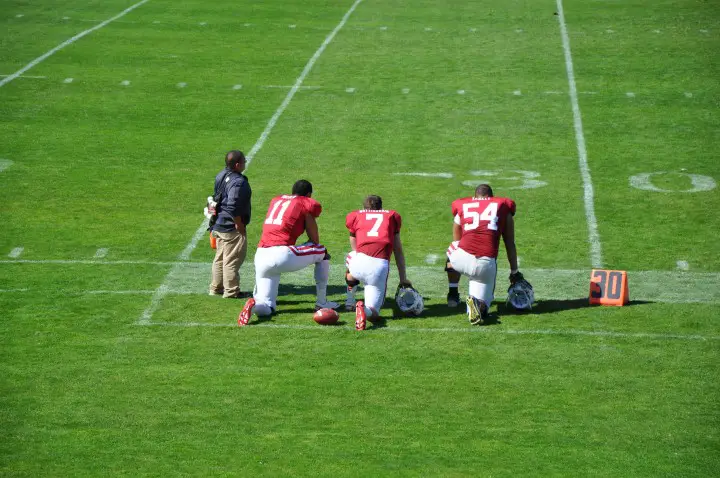Origin of the Term Football
The name “football” for the sport we know today as American Football, might seem a bit puzzling since the game is more about using hands rather than feet. However, the term “football” has historical roots tracing back to its European ancestors, soccer and rugby, which were known as kicking games.
Explanation of how the term football came about
As time went on, a rugby-style football game played in 1823 witnessed a significant shift. A player named William Webb Ellis, instead of kicking the ball over the goal line, picked it up and ran across, fundamentally changing the game. This sport, played at Rugby School, was later named as “rugby football”, then abbreviated to “rugby”. Similarly, the American version of the sport, another form of these European kicking games, maintained its name as “football”.

Comparison between the use of feet in soccer and hands in American football
While the use of hands is more prominent in American football, it’s essential to remember that the game also incorporates kicking aspects, such as punting and goal kicking. The ball is also traditionally a prolate spheroid, an elongated version of a sphere, unlike the near-round balls used in soccer. Thus, “football” remains a fitting term, regardless of the variation of the sport.
Relationship Between American Football, Soccer, and Rugby
American football, soccer, and rugby are interconnected in ways you might not expect. The term “football” traces its roots to the late Middle Ages, used to describe any sport played on foot rather than on horseback. In time, it became associated more particularly with certain games involving kicking.
Connections between American football, soccer, and rugby
The game known as “association football,” shortened to “soc” then “soccer,” and rugby, both originated as kicking games. While rugby was distinguished by a turning point in 1823 when a player named William Webb Ellis, instead of kicking the ball over the goal line, picked it up and ran with it. This bold move eventually gained acceptance, giving birth to rugby football, later shortened to just rugby.

Development of the games and their distinct rules
Over time, these soccer-style football and rugby-style football eventually crossed the pond to America. As a hybridized combination of both types was prevalent, it earned the broad name “football”. The American game continued to evolve, adding complexities such as the forward-pass rule in 1906. And thus, the game we know as football today took shape and inherited its name from these early versions of the game.
Evolution of American Football
American football, like the soccer and rugby from which it branched off, began as a kicking game. The change that set football apart from these games occurred when a player named William Webb Ellis took the liberty of picking up the ball and running with it across the goal line. This significant departure from the conventional kicking game took place in 1823 during a game of rugby at the Rugby School.
Explanation of how American football evolved from rugby
Eventually, both soccer-style football and rugby-style football found their way to America. The American game that resulted was a fusion of the European football games, leading it to also be known as football. The American football we recognize today bears similarities to these two sports but is distinct in its game dynamics and rule sets.
Impact of rule changes and adaptations
As history unfolded, rule changes were implemented to make the game fairer, safer, and more entertaining. For example, forward passing was not permitted until 1906. This continual evolution and innovation spearheaded by the NFL Competition Committee, in response to changing needs and circumstances, is part of what keeps this iconic American pastime exciting and relevant up to today.
The Name Football and Its Historical Context
Discussion on how the name football was inherited from the European games
The term “football” has a fascinating history linked to its European cousins, soccer and rugby. These games originated as kicking games and, over time, the terms often interchanged. For instance, soccer, known as ‘Association Football,’ evolved into ‘assoc,’ later becoming ‘soc,’ and eventually ‘soccer.’ Rugby, on the other hand, evolved from a game of football at Rugby School, hence the present name.
When these sports arrived in America, they combined into a unique blend, which gradually became the American version of football. The name ‘football’ was retained, given the heritage of the game. This might be confusing, given that American football has more hand usage compared to its European counterparts.
Despite the variations, the inherited terminology from Europe explains why American football is called ‘football.’ For further information on the evolution of the game and its name, consider visiting this link and this link.
Perception and Interpretation of the Name
The primary confusion about the name ‘football’, particularly in the context of American football, often boils down to the distinctive gameplay. While the sport known as ‘soccer’ extensively involves using the feet, American football is primarily hand-oriented. So, why then is it called football?
Exploration of the confusion and misconceptions surrounding the name football
It is essential to start by understanding that the term ‘football’ historically relates to games played on foot, rather than necessarily implying that the foot interacts with the ball. As the Pro Football Hall of Fame explains, American football evolved from a mix of two European games. Both these games started as kicking pastimes, known as soccer and rugby.

The game received the name ‘football’ not due to the use of the foot, but because it shared origins with these two games, thus keeping the common term. Despite its hand-oriented gameplay, American football originates from European football games, which justifies its current name.
Impact of the Name on American Football
The naming of American football remains a fascinating topic, deeply ingrained in its history and culture. Despite the confusion that the name “football” can ensue—particular for enthusiasts of soccer or rugby—the term has firmly rooted itself in American culture, associating strongly with the love of the sport. American football being called football, quite simply, reflects the sport’s lineage and growth over time.
Discussion on the significance of the name football in American culture
“Brawn and bravery” are two featured characteristics of American football. The name, “Football”, highlights the importance of both agility and strategic planning, even though the involvement of feet is minimal compared to its British counterpart. This demonstrates the American knack of making something truly their own even when its foundations lie elsewhere.
Ultimately, American football is more than just a sport—it signifies unity, competition, and a celebration of athleticism. The name ‘football’ is more than a label—it’s a symbol of America’s unique brand of entertainment and athleticism.
